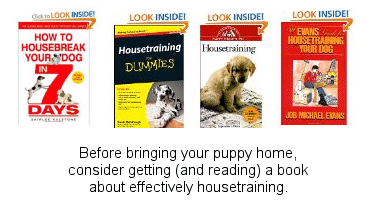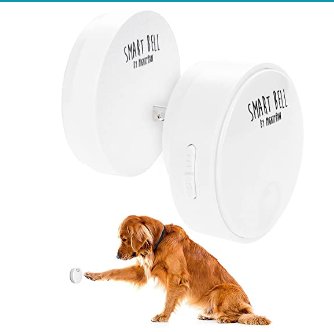Successful training isn't instant, but it's well worth the effort!
People often tell me that they've read online that beagles are hard to train. I
think this belief is caused by rumors started by non-beagle people and people
that have tried and failed because of attempting to train with poor methods and
poor consistency.
There are lots of videos on YouTube of young beagle puppies that have already
learned many tricks and good behavior commands, within 2 to 4 weeks of going to
their new homes!
Some of our beagle puppies have become Search and Rescue dogs
and therapy dogs.
Beagles are also used as drug-sniffing dogs, especially in airports because
they are non-aggressive and smaller than other drug-dog breeds.
We also know of beagles that warns their owners of impending
seizures.
So, training a beagle is definitely "do-able," and they can perform
high-importance jobs!
Training is very important for all puppies, and that
includes more than just potty training.
-
Showing your puppy that you are the
leader of your pack is urgent to prevent your puppy from wandering away and
getting lost or stolen.
-
Solid training can help prevent damage to your home.
-
Definitely, begin training the puppy to "come" from the first day
you have him/her is a very important lifelong skill.
-
Training makes your puppy happier...yes, happier!
All intelligent animals
want to feel as though they fit in. Training gives puppies a sense of
accomplishment and comfort in knowing where they fit in to the family
"pack." And honestly, they should not be allowed to be the "alpha"
or lead of the pack. That isn't good for ANY dog.
Some thoughts to consider from the beginning:
-
Crate training is extremely helpful for house/potty
training, and is not cruel. Dogs are "den"
animals, and like sleeping in a place where all sides are covered except
one. Our farm dog, Rose, makes a den in our hay barn where she can curl up
and just look out of a small opening. Summer, winter...temps don't matter.
Puppies inside the house usually find the little "den" under the computer
desk and sleep there. Dogs LIKE dens. Your job is to make sure YOU approach
crate training correctly.
-
Potty training takes time. Puppies up to 4 months old
need to potty (especially urinate) frequently. When they urinate, they don't
fully void their bladders most of the time. This makes them need to potty
more often than adult dogs, too. And, it is a reason that you'll notice your
puppy potty outside when you take him out, and then within minutes of
returning into the house, pottying again! Stick with it, check out a variety
of methods by searching the Internet, and even consider buying a book about
house training (amazon.com has several available).
95% of our puppies are voluntarily going outside to
potty 100% of the time before they leave us at 8 weeks. But they aren't
potty trained. Instead, they are a combination of crate trained
and doggie-door trained. If you installed a doggie door in your house that
went into a safely-fenced area, and attached an
indoor pen or crate to the
wall there, you could probably potty train your puppy very quickly! When the
puppy is in his/her crate, he/she could go right outside to potty. When not
in the crate (leave the crate door open so he/she can get through to the
doggie door), you'll still have to watch closely to train the puppy that the
whole HOUSE is your crate. However, the puppy may very quickly learn to rush
back through the crate and out the door.
Problem: most people don't
want to cut a hole in their door or house to install an energy-leaking
doggie door. Therefore, solid potty training methods become necessary!
If you know of another great link to add to the ones below that would help puppy
owners, please let us know so we can add it here. Because potty training and
general obedience training benefit each other, the links below cover more than
just house training.
Training Links
Potty/House Training
General Training
Biting and Dominance
Crate Training
Chewing
Shows and Grooming
Top
Potty Training (Housetraining)

The potty training is the toughest thing for me, also. So much of it is
"timing," so we start by taking the puppy outside as soon as he/she wakes up
from a nap, and also within 20 minutes of eating if he hasn't shown signs of
wanting to go after eating.
We can usually tell if a puppy has to (I guess I have to say this
word...unavoidable, LOL!) poop. ;-) When they need to go, their bottom/anus
will be puffing out a little bit. If it isn't puffing out, "usually," they
aren't close enough to needing to potty to be able to get them to go at this
age. You'll quickly learn to recognize that physical sign, and also his
signs of looking for a place to go.
We like to take them to the door, set them on the floor, and either tap
their paw on the door or ring a bell (hanging from a string or a bell that
is suctioned to the floor) before proceeding outside. This teaches them that
they need to "give a sign" at the door to signify that they need to go
outside. If we pick them up and carry outside, without stopping and asking
them to make a signal, it may take longer to get them to give us a sign.

Dog potty bells on Amazon
Dog potty bells on
Chewy
(Don't get the paw-shaped one...the round/square/rectangles are much
easier for puppies to use)
General Training
3 0 Days to Puppy
Perfection, online course:
30 Days to Puppy Perfection - How to Train A Dream Dog
All Training Topics...very nice site!
http://www.canismajor.com/dog/ttrain.html
Puppy Training Tips
http://www.perfectpaws.com/pup17.html
Puppy Training Rules
http://www.peteducation.com/article.cfm?cls=2&cat=1549&articleid=173
Miscellaneous tips
http://p4.hostingprod.com/@quietwinterfarm.org/House_breaking_101.html
Video clips for common
"tricks"
http://www.ehow.com/videos-on_1381_train-beagle.html
Commands/Vocabulary/Common
Words used for training
Online/Remote Training Classes can be REALLY
HELPFUL! Search online for "online puppy training class" or similar
key words.
Here are some example results...I have not taken all of these
courses, so am not indicating that they are tested by me/us.
I'm just sharing some search results with you.
Puppy Starter Classes https://www.howtotrainadreamdog.com/puppy-training-classes/
https://www.akc.org/expert-advice/training/online-training-a-new-resource-for-dog-owners/
(info, and a few links to training)
https://www.thesprucepets.com/best-online-dog-training-courses-5075564
https://www.howtotrainadreamdog.com/ Online training (MANY
FREE VIDEOS), YouTube
videos, Zoom meeting options (free and also paid-for training)
https://www.petco.com/shop/en/petcostore/c/online-dog-training-courses
https://spiritdogtraining.com/online-dog-training/
Zak George's Dog Training Revolution, New Puppy Channel:
Zak's Puppy Youtube Channel/Video List
Kikopup Youtube Channel:
Dog
Training by Kikopup - YouTube
Some of the above are FREE.
Paid online training courses
are probably even better, though.
The free online "courses" typically tell you "what to teach them to do," but
not always HOW to teach them those things.
Through searching and reading lots of blogs and watching
lots of videos, you CAN piece together those teaching tips. Or, you can pay
for a course, and find out HOW to train a lot more easily than piecing it
together by yourself. Examples:
30 Days to Puppy Perfection
https://www.howtotrainadreamdog.com/puppy-perfection-course/
https://www.puppytrainedright.com/site/home
Biting and Dominance
Puppies need structure and rules. Without structure and rules, they feel lost
and out of control. They may then act in ways that seem like they are going to
be "bad dogs." But, structure and showing puppies what is and isn't appropriate
behavior can guide them to becoming the best dog you could ever hope for!
The first article seems to work well for us, and is quite different from most of
the other articles. It is based upon acting the way another adult dog would act
in response to puppy aggression. Some people don't recommend it, but it really
can work quickly to stop aggressive biting in young puppies.
Teach the puppy that you are alpha over her (the first link)
Teach the puppy that you don't like being bitten, and you won't play after she
bites (stopping play with a "time out")
Make biting unpleasant without punishing (pushing fingers FARTHER into mouth
when biting occurs...some trainers love this, some disapprove)
Using play time to train puppy to do tricks until the biting stage is over.
You may only need to do one of these, or you might try several/all tips at one
time until her biting phase is over.
ideo from How to
Train a Dream Dog:
https://www.youtube.com/watch?v=bn1nGZ9MgzQ&feature=youtu.be
How to combat puppy biting:
http://www.canismajor.com/dog/bite2.html (using a method you would see another
dog use toward a biting puppy)
Rules and structure...the setup for behavior expectations:
https://www.brilliantfamilydog.com/blog/10-ways-to-stop-puppy-biting
Caesar's tips:
https://www.cesarsway.com/dog-behavior/biting/nipping-nipping-in-the-bud
Simple explanation and tips:
https://pets.webmd.com/dogs/guide/biting-puppy-how-train-puppy-bites (I like
this from this article: "Avoid jerking your hands or feet away from your puppy
when he mouths. This will encourage him to jump forward and grab at you. Itís
much more effective to let your hands or feet go limp so that they arenít much
fun to play with."
Taking that a step further, I know some people have had success very quickly
with sticking their fingers INTO puppies mouths during biting...like you are
trying to push a pill down the back of the puppy's throat. Puppies don't like
that, and soon learn that they don't want to bite because you'll make it
unpleasant.
AKC's tips:
https://www.akc.org/expert-advice/training/puppy-training/how-prevent-puppy-biting/
I also like that there is a popup on this page where you can insert your
puppy's birthday, and AKC will send you tips for timely advice based upon your
puppy's age.
More reinforcement about "biting results in me not interacting
with you!"
https://www.preventivevet.com/dogs/how-to-stop-puppy-nipping-and-biting
Simple tips to stop biting:
http://www.dogbreedinfo.com/puppybiting.htm
Training! Making play time "training time" to keep your puppy
busy can engage his brain in a good way while he goes through the biting stage!
51 Puppy Tricks (a book with simple tricks to teach your puppy, making
for constructive and fun play while redirecting puppy away from biting)
Reducing "doggie dominance"
http://www.inch.com/~dogs/taming.html
Crate Training
Chewing
Training (and Grooming)
for Shows
Potty/House Training
General Training
Biting and Dominance
Crate Training
Chewing
Shows and Grooming
Top
 |
|






 |
|











